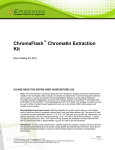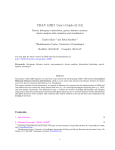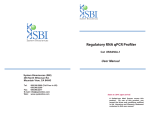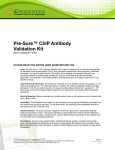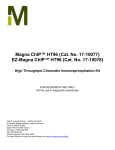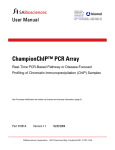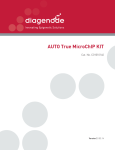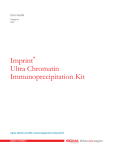Download EpiQuik Histone H3 Modification Multiplex Assay Kit
Transcript
EPIGENTEK Complete Solutions for Epigenetics EpiQuik™ Histone H3 Modification Multiplex Assay Kit (Colorimetric) Base Catalog # P-3100 PLEASE READ THIS ENTIRE USER GUIDE BEFORE USE Uses: The EpiQuik™ Histone H3 Modification Multiplex Assay Kit (Colorimetric) is suitable for specifically measuring up to 21 histone H3 modifications simultaneously from human, mouse, rat, and other species including most plants, fungi, and bacteria based on high sequence homology of histone H3. Starting materials can be in a variety of forms including cultured cells and fresh/frozen tissues. Histone extracts can be prepared by using your own successful method. The prepared histone extracts should not contain detergents. Each kit can be used for two different samples or a pair of samples: control and treated, normal and diseased, and other paired comparisons. Input Material: Input materials can be histone extracts or purified histone H3 proteins. The amount of histone extracts for each assay can be 20 ng to 500 ng with an optimal range of 50 to 100 ng depending on the purity of histone extracts. The amount of purified histone H3 proteins for each assay can be 1 ng to 25 ng with an optimal range of 4 to 5 ng. Internal Control: An assay control is provided in this kit. It can be used for signal intensity comparison between the assay control and the samples to indicate the amount of each histone H3 modification captured from the samples. Because the content of each histone H3 modification can vary from tissue to tissue, and from normal and diseased states, or from different treatments, it is advised to run duplicate for each sample to ensure that the signal generated is validated. Precautions: To avoid cross-contamination, carefully pipette the sample or solution into the strip wells. Use aerosol-barrier pipette tips and always change pipette tips between liquid transfers. Wear gloves throughout the entire procedure. In case of contact between gloves and sample, change gloves immediately. 110 Bi County Blvd. Ste. 122, Farmingdale, NY 11735 Tel: 1-877-374-4368 ■ Fax: 1-718-484-3956 ■ E-mail: [email protected] ■ Web: www.epigentek.com © Epigentek Group Inc. All rights reserved. Products are for research use only. Page 1 Printed 2014-09-22 P-3100 EPIGENTEK Complete Solutions for Epigenetics KIT CONTENTS Component 96 Assays Cat. #P-3100-96 Storage Upon Receipt WB (10X Wash Buffer) 28 ml 4°C AB (Antibody Buffer) 8 ml 4°C DA (Detection Antibody, 1000X)* 12 µl -20°C DS (Developer Solution) 12 ml 4°C SS (Stop Solution) 12 ml RT Assay Control Protein (100 µg/ml) 20 µl –20°C 96-Well Strip Plate (With Frame) 1 4°C Extra 8-Well Strips 2 4°C Adhesive Covering Film 1 RT User Guide 1 RT * Spin the solution down to the bottom prior to use. SHIPPING & STORAGE The kit is shipped in two parts: the first part at ambient room temperature, and the second part on frozen ice packs at 4°C. Upon receipt: (1) Store DA and Assay Control Protein at –20°C away from light; (2) Store WB, AB, DS, 96-Well Strip Plate, and Extra 8-Well Strips at 4°C away from light; and (3) Store remaining components (SS and Adhesive Covering Film) at room temperature away from light. All components of the kit are stable for 6 months from the date of shipment, when stored properly. Note: (1) Check if WB (10X Wash Buffer) contains salt precipitates before use. If so, warm (at room temperature or 37°C) and shake the buffer until the salts are re-dissolved; and (2) Check if a blue color is present in DS (Developer Solution), which would indicate contamination of the solution and should not be used. To avoid contamination, transfer the amount of DS required into a secondary container (tube or vial) before adding DS into the assay wells. MATERIALS REQUIRED BUT NOT SUPPLIED Adjustable pipette or multiple-channel pipette Multiple-channel pipette reservoirs Aerosol resistant pipette tips Microplate reader capable of reading absorbance at 450 nm 1.5 ml microcentrifuge tubes Incubator for 37°C incubation Distilled water 110 Bi County Blvd. Ste. 122, Farmingdale, NY 11735 Tel: 1-877-374-4368 ■ Fax: 1-718-484-3956 ■ E-mail: [email protected] ■ Web: www.epigentek.com © Epigentek Group Inc. All rights reserved. Products are for research use only. Page 2 Printed 2014-09-22 P-3100 EPIGENTEK Complete Solutions for Epigenetics Histone extracts or purified histone proteins Parafilm M or aluminum foil GENERAL PRODUCT INFORMATION Quality Control: Each lot of the EpiQuik™ Histone H3 Modification Multiplex Assay Kit (Colorimetric) is tested against predetermined specifications to ensure consistent product quality. Epigentek guarantees the performance of all products in the manner described in our product instructions. Product Warranty: If this product does not meet your expectations, simply contact our technical support unit or your regional distributor. We also encourage you to contact us if you have any suggestions about product performance or new applications and techniques. Safety: Suitable lab coat, disposable gloves, and proper eye protection are required when working with this product. Product Updates: Epigentek reserves the right to change or modify any product to enhance its performance and design. The information in this User Guide is subject to change at any time without notice. Thus, only use the User Guide that was supplied with the kit when using that kit. Usage Limitation: The EpiQuik™ Histone H3 Modification Multiplex Assay Kit (Colorimetric) is for research use only and is not intended for diagnostic or therapeutic application. A BRIEF OVERVIEW Histone modifications have been defined as epigenetic modifiers. Post-translational modifications of histones include the acetylation of specific lysine residues by histone acetyltransferases (HATs), deacetylation by histone deacetylase (HDACs), the methylation of lysine and arginine residues by histone methytransferases (HMTs), the demethylation of lysine residues by histone demethylases (HDMTs), and the phosphorylation of specific serine groups by histone kinases (HKs). Additional histone modifications include the attachment of ubiquitin (Ub), small ubiquitin-like modifiers (SUMOs), and poly ADP-ribose (PAR) units. Next to DNA methylation, histone acetylation and histone methylation are the most well characterized epigenetic marks. Generally, tri-methylation at H3-K4, H3K36, or H3-K79 results in an open chromatin configuration and is therefore characteristic of euchromatin. Euchromatin is also characterized by a high level of histone acetylation, which is mediated by histone acetyltransferases. Conversely, histone deacetylases have the ability to remove this epigenetic mark, which leads to transcriptional repression. Condensed heterochromatin is enriched in tri-methylation of H3-K9 and H3-K27 and silencing of euchromatin loci caused by histone deacetylation involves the recruitment of specific K9 histone methyltransferases. Methylated H3-K9 provides a binding site for the chromodomain-containing heterochromatin protein 1 (HP1), which induces transcriptional repression and heterochromatinization. At euchromatic loci, this process is mediated by co-repressors, such as retinoblastoma protein pRb or KAP1. Histone demethylases have the opposite effect on transcription. For example, the histone demethylase LSD1 is responsible for H3K4 demethylation, which leads to transcriptional inactivation. Other histone demethylases, such as jumonji (JHDM2A), are responsible for H3K9 demethylation, whereas JHDM1 has the ability to convert active chromatin marks such as H3-K36me2, to an unmodified state. Lysine residues can be mono-, di-, or trimethylated, each of which can differentially regulate chromatin structure and transcription. Along with other histone modifications such as phosphorylation, this enormous variation leads to a multiplicity of possible combinations of different modifications. This may constitute a “histone code”, which can be read and interpreted by different cellular factors. 110 Bi County Blvd. Ste. 122, Farmingdale, NY 11735 Tel: 1-877-374-4368 ■ Fax: 1-718-484-3956 ■ E-mail: [email protected] ■ Web: www.epigentek.com © Epigentek Group Inc. All rights reserved. Products are for research use only. Page 3 Printed 2014-09-22 P-3100 EPIGENTEK Complete Solutions for Epigenetics Abnormal histone modification patterns have been associated with many different diseases such as cancer, autoimmune disorders, and inflammatory and neurological diseases. Therefore, detection of histone H3 modifications would provide useful information for a better understanding of epigenetic regulation of gene activation and silencing, histone modification-associated pathological disease process, as well as for developing histone modification-targeted drugs. As the leading provider of histone modification assay products, Epigentek was the first company to offer a series of kits for singleplex quantification of each histone H3 modification. We have further refined our assay expertise by developing the EpiQuik™ Histone H3 Modification Multiplex Assay Kit. As the first multiplex assay for detecting up to 21 modified histone H3 patterns simultaneously, this kit has the following advantages: Simultaneously measure 21 different histone H3 modifications, which include all of the most important and the most well-characterized patterns. H3K4me1 H3K4me2 H3K4me3 H3K9me1 H3K9me2 H3K9me3 H3K27me1 H3K27me2 H3K27me3 H3K36me1 H3K36me2 H3K36me3 H3K79me1 H3K79me2 H3K79me3 H3K9ac H3K14ac H3K18ac H3K56ac H3ser10P H3ser28P Total H3 Quick and efficient procedure, which can be finished within 2.5 hours. Innovative colorimetric assay without the need for radioactivity, electrophoresis, chromatography, or expensive equipment. High sensitivity with a detection limit as low as 0.5 ng/well for each modification pattern and a detection range from 20 ng to 500 ng/well of histone extracts. An assay control is conveniently included for quantification of each histone H3 modification. Total histone H3 sets are included, which can be used for normalizing total histone H3 levels for relative comparison of histone H3 content between different samples or different treatment conditions Strip microplate format makes the assay flexible: manual or high throughput, which enables analysis of a single modification or total 21 modification patterns within the same samples. Two extra 8-well strips are included in the kit which can be used, if necessary, for sample amount pre-optimization to determine the input amount (ex: 50, 100, 200 ng/well) needed to fall within the detection limits of the assay. Extra strips may also be used as assay controls and total histone level controls if selective detection of some histone H3 modifications from the total 21 modification pattern is desired. Simple, reliable, and consistent assay conditions. PRINCIPLE & PROCEDURE The EpiQuik™ Histone H3 Modification Multiplex Assay Kit (Colorimetric) is designed for measuring multiple histone H3 modifications simultaneously. In an assay with this kit, each histone H3 modified at specific sites will be captured by an antibody that is coated on the strip wells and specifically targets the appropriate histone modification pattern. The captured histone modified at specific sites will be detected with a detection antibody, followed by a color development reagent. The ratio of modified 110 Bi County Blvd. Ste. 122, Farmingdale, NY 11735 Tel: 1-877-374-4368 ■ Fax: 1-718-484-3956 ■ E-mail: [email protected] ■ Web: www.epigentek.com © Epigentek Group Inc. All rights reserved. Products are for research use only. Page 4 Printed 2014-09-22 P-3100 EPIGENTEK Complete Solutions for Epigenetics histone is proportional to the intensity of absorbance measured by a microplate reader at a wavelength of 450 nm. Fig. 1. Schematic procedure of the EpiQuik™ Histone H3 Modification Multiplex Assay Kit (Colorimetric) Fig. 2. Working principle of EpiQuik™ Histone H3 Modification Multiplex Assay (Colorimetric) 1.2 1.1 1 0.9 MCF-7 MDA-231 OD450 nm 0.8 0.7 0.6 0.5 0.4 0.3 0.2 0.1 Bl a To nk ta lH H3 3 K4 H3 m 1 K4 m H3 2 K4 m H3 3 K9 H3 m 1 K9 m H3 2 K H3 9m K2 3 7 H3 m 1 K2 H3 7m K2 2 7 H3 m 3 K3 6 H3 m 1 K3 H3 6m K3 2 6 H3 m 3 K7 H3 9m K7 1 9 H3 m 2 K7 9m H3 3 K9 H3 ac K1 4 H3 ac K1 H3 8ac K H3 56a se c r H3 10P se r2 8P 0 Histone modifications Fig. 3. Histone extracts were prepared from MCF-7 and MDA-231 cells using the EpiQuik™ Total Histone Extraction Kit (Epigentek, #OP-0006) and 21 histone H3 modifications were measured using the EpiQuik™ Histone H3 Modification Multiplex Assay Kit (Colorimetric). 100 ng of total histone proteins per well were used. 110 Bi County Blvd. Ste. 122, Farmingdale, NY 11735 Tel: 1-877-374-4368 ■ Fax: 1-718-484-3956 ■ E-mail: [email protected] ■ Web: www.epigentek.com © Epigentek Group Inc. All rights reserved. Products are for research use only. Page 5 Printed 2014-09-22 P-3100 EPIGENTEK Complete Solutions for Epigenetics PROTOCOL For the best results, please read the protocol in its entirety prior to starting your experiment. Starting Materials Input Amount: The amount of histone extracts for each assay can be between 20 ng to 500 ng with an optimal range of 50 ng to 100 ng. Histone Extraction: You can use your method of choice for preparing histone extracts from treated and untreated samples. The prepared histone extracts should not contain detergents such as SDS, Tween, Triton X-100, or NP-40. Epigentek also offers a histone extraction kit (Cat # OP-0006) optimized for use with this kit. Histone extracts should be stored in aliquots at –80°C until use. Use of Extra Strips If necessary, the extra strips included in the kit can be used for input amount pre-optimization or used as controls if only a few histone H3 modifications are selected for detection. The strips can be set up as indicated in Table 3 and Table 4 under the “Extra Strip Well Setup” section and carried out by using the same assay protocol described below. 1. Working Buffer and Solution Preparation a. Prepare Diluted WB 1X Wash Buffer: 96-Assays: Add 26 ml of WB 10X Wash Buffer to 234 ml of distilled water and adjust pH to 7.2-7.5. This Diluted WB can now be stored at 4°C for up to six months. b. Prepare Diluted DA Detection Antibody solution: Dilute DA Detection Antibody with Diluted WB at a ratio of 1:1000 (i.e., add 1 µl of DA to 1000 µl of Diluted WB). 50 µl of Diluted DA will be required for each assay well. c. Prepare Diluted Assay Control Protein Suggested Assay Control Preparation: Prepare 2 concentrations by combining the 100 ng/µl Assay Control Protein with AB into final concentrations of 5 and 25 ng/µl according to the following dilution chart. The high concentration (25 ng/µl) of the Assay Control Protein can be used for a simple amount quantification of histone H3 modification and total H3. The low concentration (5 ng/ul) along with high concentration is used to generate proportional concentration-signal intensity for determining if the assay control works properly. Tube Assay Control (100 ng/µl) AB Resulting Assay Control Concentration 1 1.0 µl 19.0 µl 5 ng/µl 2 1.0 µl 3.0 µl 25 ng/µl 110 Bi County Blvd. Ste. 122, Farmingdale, NY 11735 Tel: 1-877-374-4368 ■ Fax: 1-718-484-3956 ■ E-mail: [email protected] ■ Web: www.epigentek.com © Epigentek Group Inc. All rights reserved. Products are for research use only. Page 6 Printed 2014-09-22 P-3100 EPIGENTEK Complete Solutions for Epigenetics Note: Keep each of the diluted solutions except Diluted WB on ice until use. Any remaining diluted solutions other than Diluted WB should be discarded if not used within the same day. 2. Histone Binding a. Predetermine the number of strip wells required for your experiment. It is advised to run replicate samples (include blank and positive controls) to ensure that the signal generated is validated. Carefully remove un-needed strip wells from the plate frame and place them back in the bag (seal the bag tightly and store at 4°C). Note: If removing strip wells, you must absolutely keep track of which wells have been removed, as each well represents a specific histone modification pattern according to Table 2 of the “Strip Well Setup” section. b. Blank Wells: Add 49 µl of AB to each blank well. c. Control Wells: Add 49 µl of AB and 1 µl of Diluted Assay Control Protein to each standard well using 2 wells for each concentration point (5 and 25 ng/well) (based on the dilution chart in Step 1c; see Table 2 as an example). d. Sample Wells: Add 46 to 49 µl of AB and 1 to 4 µl of your histone extracts. Total volume should be 50 µl per well. Note: (1) Follow the strip well setup diagrams (Table 2); (2) It is recommended to use 50-100 ng or pre-optimized amount of histone extract per well. e. Tightly cover strip-well microplate with Adhesive Covering Film to avoid evaporation and incubate at 37°C for 60 to 120 min. Note: The Adhesive Covering Film can be cut to the required size to cover the strips based on the number of strips to be used. f. Remove the reaction solution from each well. Wash each well three times with 150 µl of the Diluted WB each time. 3. Antibody Binding a. Add 50 µl of the Diluted DA to each well, then cover with Parafilm M or aluminum foil and incubate at room temperature for 60 min. b. Remove the Diluted DA solution from each well. c. Wash each well four times with 150 µl of the Diluted WB each time. Note: Ensure any residual wash buffer in the wells is removed as much as possible at each wash step. 4. Signal Detection a. Add 100 µl of DS to each well and incubate at room temperature for 1 to 10 min away from light. Begin monitoring color change in the sample wells and control wells within one minute. The DS solution will turn blue in the presence of sufficient modified products. 110 Bi County Blvd. Ste. 122, Farmingdale, NY 11735 Tel: 1-877-374-4368 ■ Fax: 1-718-484-3956 ■ E-mail: [email protected] ■ Web: www.epigentek.com © Epigentek Group Inc. All rights reserved. Products are for research use only. Page 7 Printed 2014-09-22 P-3100 EPIGENTEK Complete Solutions for Epigenetics Note: Average color development time is 2-5 minutes. Use control wells and blank wells as a reference for color development. b. Add 100 µl of SS to each well to stop enzyme reaction when color in the positive control wells turns medium blue. The color will change to yellow after adding SS and the absorbance should be read on a microplate reader within 2 to 10 min at 450 nm with an optional reference wavelength of 655 nm. Note: (1) Most microplate readers have the capability to carry out dual wavelength analysis and will automatically subtract reference wavelength absorbance from the test wavelength absorbance. If your plate reader does not have this capability, the plate can be read twice, once at 450 nm and once at 655 nm. Then, manually subtract the 655 nm ODs from 450 nm ODs; (2) If the strip-well microplate frame does not fit in the microplate reader, transfer the solution to a standard 96-well microplate. 5. Histone H3 Modification Calculation a. Calculate the average duplicate readings for the sample wells, assay control wells and blank wells. b. Simple amount quantification of each H3 modification or total H3 in the samples can be carried out using Formula 1 shown below: Formula 1: (Sample OD – Blank OD) ÷ S H3 Modification or total H3 (ng/µg protein) = x 1000 (Assay Control OD – Blank OD) ÷ P S is the amount of input sample protein in ng. P is the amount of input assay control in ng (use 25 ng). Example calculation: Average OD450 of blank is 0.115 Average OD450 of Assay control is 0.775 Average OD450 of Sample (H3 modification or total H3) is 0.575 S is 100 ng P is 25 ng (0.575-0.115) ÷ 100 H3 Modification or total H3 (ng/µg protein) = x 1000 =174 .2 ng/µg protein (0.775-0.115) ÷ 25 c. Calculate the percentage of histone H3 modification in total H3 using Formula 2 shown below: Formula 2: H3 Modification % = Amount of H3 modification (ng/µg protein ) x 100% Amount of total H3 (ng/µg protein) The amount of H3 modification or total H3 is calculated from Formula 1. 110 Bi County Blvd. Ste. 122, Farmingdale, NY 11735 Tel: 1-877-374-4368 ■ Fax: 1-718-484-3956 ■ E-mail: [email protected] ■ Web: www.epigentek.com © Epigentek Group Inc. All rights reserved. Products are for research use only. Page 8 Printed 2014-09-22 P-3100 EPIGENTEK Complete Solutions for Epigenetics d. Calculate the relative change of each histone H3 modification between different samples using Formula 3 shown below: Formula 3: H3 modification % in sample 1 or treated sample x 100% Relative Change % = H3 modification % in sample 2 or control sample SUGGESTED BUFFER AND SOLUTION SETUP Table 1. Approximate amount of required buffers and solutions for defined assay wells based on the protocol. Reagents 1 well 1 strip (8 wells) 2 strips (16 wells) 6 strips (48 wells) 12 strips (96 wells) Diluted WB 1.2 ml 10 ml 20 ml 60 ml 120 ml Diluted DA 50 µl 400 µl 800 µl 2400 µl 4800 µl Assay Control Protein N/A N/A 2 µl 2 µl 2 µl DA (Developer Solution) 0.1 ml 0.8 ml 1.6 ml 4.8 ml 9.6 ml SS (Stop Solution) 0.1 ml 0.8 ml 1.6 ml 4.8 ml 9.6 ml STRIP WELL SETUP Table 2. An antibody for each H3 modification is coated onto the indicated wells accordingly 1 2 3 4 5 6 7 8 9 10 11 12 Assay control 5 ng Assay control 5 ng Assay control 25 ng Assay control 25 ng Total H3 Blank H3K4me2 H3K9me1 H3K9me3 H3K27me2 H3K36me1 H3K36me3 H3K79me2 H3K9ac H3K18ac H3ser10P Blank H3K4me2 H3K9me1 H3K9me3 H3K27me2 H3K36me1 H3K36me3 H3K79me2 H3K9ac H3K18ac H3ser10P Blank H3K4me2 H3K9me1 H3K9me3 H3K27me2 H3K36me1 H3K36me3 H3K79me2 H3K9ac H3K18ac H3ser10P Blank H3K4me2 H3K9me1 H3K9me3 H3K27me2 H3K36me1 H3K36me3 H3K79me2 H3K9ac H3K18ac H3ser10P H3K4me1 H3K4me3 H3K9me2 H3K27me1 H3K27me3 H3K36me2 H3K79me1 H3K79me3 H3K14ac H3K56ac H3ser28P F Total H3 H3K4me1 H3K4me3 H3K9me2 H3K27me1 H3K27me3 H3K36me2 H3K79me1 H3K79me3 H3K14ac H3K56ac H3ser28P G H Total H3 H3K4me1 H3K4me3 H3K9me2 H3K27me1 H3K27me3 H3K36me2 H3K79me1 H3K79me3 H3K14ac H3K56ac H3ser28P Total H3 H3K4me1 H3K4me3 H3K9me2 H3K27me1 H3K27me3 H3K36me2 H3K79me1 H3K79me3 H3K14ac H3K56ac H3ser28P A B C D E EXTRA STRIP WELL SETUP Table 3. Two extra strip wells can be set up for input amount pre-optimization. Different concentrations of samples can be added to wells C through H as shown below. 110 Bi County Blvd. Ste. 122, Farmingdale, NY 11735 Tel: 1-877-374-4368 ■ Fax: 1-718-484-3956 ■ E-mail: [email protected] ■ Web: www.epigentek.com © Epigentek Group Inc. All rights reserved. Products are for research use only. Page 9 Printed 2014-09-22 P-3100 EPIGENTEK Complete Solutions for Epigenetics Sample1 Blank Assay control 25 ng 50 ng 50 ng 100 ng 100 ng 200 ng 200 ng A B C D E F G H Sample 2 Blank Assay control 25 ng 50 ng 50 ng 100 ng 100 ng 200 ng 200 ng Table 4. Alternatively, the two extra strip wells can be set up as controls for detection of select H3 modifications (each strip can be used as an extra control for the assay). A B C D E F G H 1 Assay Control 5 ng Assay Control 5 ng Assay Control 25 ng Assay Control 25 ng Total H3 sample 1 Total H3 sample 1 Total H3 Sample 2 Total H3 Sample 2 2 Assay Control 5 ng Assay Control 5 ng Assay Control 25 ng Assay Control 25 ng Total H3 sample 1 Total H3 sample 1 Total H3 Sample 2 Total H3 Sample 2 TROUBLESHOOTING Problem Possible Cause Suggestion No signal or weak signal in both the Assay Control and sample wells Reagents are added incorrectly. Check if reagents are added in the proper order with the right amount, and if any steps in the protocol may have been omitted by mistake. Incubation time and temperature are incorrect. Ensure the incubation time and temperature described in the protocol are followed correctly. Incorrect absorbance reading. Check if appropriate absorbance wavelength (450 nm) is used. Kit was not stored or handled properly. Ensure all components of the kit were stored at the appropriate temperature and the cap is tightly closed after each opening or use. The Assay Control Protein amount is insufficiently added to the well in Step 2c. Ensure a sufficient amount of Assay Control Protein is added. The Assay Control Protein is degraded due to improper storage conditions. Follow the Shipping & Storage guidance in this User Guide for storage of Assay Control Protein. No signal or weak signal in only the Assay Control wells 110 Bi County Blvd. Ste. 122, Farmingdale, NY 11735 Tel: 1-877-374-4368 ■ Fax: 1-718-484-3956 ■ E-mail: [email protected] ■ Web: www.epigentek.com © Epigentek Group Inc. All rights reserved. Products are for research use only. Page 10 Printed 2014-09-22 P-3100 EPIGENTEK Complete Solutions for Epigenetics High background present in the blank wells. No signal or weak signal only in sample wells or for some of H3 modification patterns. Uneven color development. Large variation between replicate wells. Insufficient washing of wells. Check if washing recommendations at each step is performed according to the protocol. Contaminated by sample or Assay Control Protein. Ensure the well is not contaminated from adding sample or Assay Control Protein accidentally or from using contaminated tips. Incubation time with Diluted DA is too long. The incubation time at Step 3a should not exceed 90 min. Over-development of color. Decrease the development time in Step 4a before adding SS Stop Solution in Step 4b. Protein sample is not properly extracted or purified. Ensure your protocol is suitable for histone protein extraction. For the best results, it is advised to use EpiQuik Total Histone Extraction Kit (Epigentek, #OP-0006). Sample amount added into the wells is insufficient. Ensure a sufficient amount of histone extracts is used as indicated in Step 2d. The sample can be titrated to determine the optimal amount to use in the assay. Sample was not stored properly or has been stored for too long. Ensure sample is stored in aliquots at – 80°C. Histone extracts should be stored for up to 6 months at –80°C. Little or no modified H3 at specific sites in the sample. This problem may be a result of many factors. If the affecting factors cannot be determined, use new or re-prepared histone extracts. Insufficient washing of the wells. Ensure the wells are washed according to the guidance of washing, and that the residual washing buffer is removed as much as possible. Delayed color development or delayed stopping of color development in the wells. Ensure DS Development Solution or SS Stop Solution is added sequentially and is consistent with the order you added the other reagents (e.g., from well A to well G or from well 1 to well 12). Color reaction is not evenly stopped due to an inconsistency in pipetting time. Ensure DS Developer Solution and SS Stop Solution are added at the same time between replicates or otherwise maintain a consistent timing in between each addition of solutions. Color reaction is not evenly stopped due to an inconsistent order of adding solutions. Ensure all solutions, particularly DS Developer Solution and SS Stop Solution, are added in the same order each time as all other solutions. The solutions are not evenly added due to inconsistency in pipetting volume. Ensure the solution in each pipette tip is equal in the multi-channel pipette. Equilibrate the pipette tip in any solutions before adding them. Ensure the solutions, 110 Bi County Blvd. Ste. 122, Farmingdale, NY 11735 Tel: 1-877-374-4368 ■ Fax: 1-718-484-3956 ■ E-mail: [email protected] ■ Web: www.epigentek.com © Epigentek Group Inc. All rights reserved. Products are for research use only. Page 11 Printed 2014-09-22 P-3100 EPIGENTEK Complete Solutions for Epigenetics especially those with small volumes (e.g., 1 µl) are completely added into the wells. Solutions or antibodies were not actually added into the wells. Do not allow the pipette tip to touch the outer edges or inner sides of the wells to prevent solutions from sticking to the surface. SS Stop Solution was not evenly distributed in the wells in Step 4b. Gently and evenly shake the plate frame across a flat surface so that the solutions in the wells are better distributed. Do not stir. Did not use the same pipette device throughout the experiment. Use the same multi-channel pipette device throughout the entire experiment, as different pipette devices may have slight variations in performance. RELATED PRODUCTS Histone Extract Preparation OP-0006 EpiQuik™ Total Histone Extraction Kit OP-0007 EpiQuik™ Total Histone Extraction HT Kit Singleplex Histone Modification Quantification P-3022 EpiQuik Global Di-Methyl Histone H3K4 Quantification Kit (Colorimetric) P-3023 EpiQuik Global Di-Methyl Histone H3K4 Quantification Kit (Fluorometric) P-3024 EpiQuik Global Mono-Methyl Histone H3K4 Quantification Kit (Colorimetric) P-3025 EpiQuik Global Mono-Methyl Histone H3K4 Quantification Kit (Fluorometric) P-3026 EpiQuik Global Tri-Methyl Histone H3K4 Quantification Kit (Colorimetric) P-3027 EpiQuik Global Tri-Methyl Histone H3K4 Quantification Kit (Fluorometric) P-3028 EpiQuik Global Pan-Methyl Histone H3K4 Quantification Kit (Colorimetric) P-3029 EpiQuik Global Pan-Methyl Histone H3K4 Quantification Kit (Fluorometric) P-3030 EpiQuik Global Mono-Methyl Histone H3K9 Quantification Kit (Colorimetric) P-3031 EpiQuik Global Mono-Methyl Histone H3K9 Quantification Kit (Fluorometric) P-3032 EpiQuik Global Di-Methyl Histone H3K9 Quantification Kit (Colorimetric) P-3033 EpiQuik Global Di-Methyl Histone H3K9 Quantification Kit (Fluorometric) P-3034 EpiQuik Global Tri-Methyl Histone H3K9 Quantification Kit (Colorimetric) P-3035 EpiQuik Global Tri-Methyl Histone H3K9 Quantification Kit (Fluorometric) P-3036 EpiQuik Global Pan-Methyl Histone H3K9 Quantification Kit (Colorimetric) P-3037 EpiQuik Global Pan-Methyl Histone H3K9 Quantification Kit (Fluorometric) P-3038 EpiQuik Global Mono-Methyl Histone H3K27 Quantification Kit (Colorimetric) P-3039 EpiQuik Global Mono-Methyl Histone H3K27 Quantification Kit (Fluorometric) P-3040 EpiQuik Global Di-Methyl Histone H3K27 Quantification Kit (Colorimetric) P-3041 EpiQuik Global Di-Methyl Histone H3K27 Quantification Kit (Fluorometric) P-3042 EpiQuik Global Tri-Methyl Histone H3K27 Quantification Kit (Colorimetric) P-3043 EpiQuik Global Tri-Methyl Histone H3K27 Quantification Kit (Fluorometric) P-3044 EpiQuik Global Pan-Methyl Histone H3K27 Quantification Kit (Colorimetric) P-3045 EpiQuik Global Pan-Methyl Histone H3K27 Quantification Kit (Fluorometric) P-3046 EpiQuik Global Mono-Methyl Histone H3K36 Quantification Kit (Colorimetric) P-3047 EpiQuik Global Mono-Methyl Histone H3K36 Quantification Kit (Fluorometric) P-3048 EpiQuik Global Di-Methyl Histone H3K36 Quantification Kit (Colorimetric) P-3049 EpiQuik Global Di-Methyl Histone H3K36 Quantification Kit (Fluorometric) 110 Bi County Blvd. Ste. 122, Farmingdale, NY 11735 Tel: 1-877-374-4368 ■ Fax: 1-718-484-3956 ■ E-mail: [email protected] ■ Web: www.epigentek.com © Epigentek Group Inc. All rights reserved. Products are for research use only. Page 12 Printed 2014-09-22 P-3100 EPIGENTEK Complete Solutions for Epigenetics P-3050 P-3051 P-3052 P-3053 P-3054 P-3055 P-3056 P-3057 P-3058 P-3059 P-3060 P-3061 P-3062 P-3063 P-4010 P-4011 P-4012 P-4013 P-4014 P-4015 P-4016 P-4017 P-4018 P-4019 P-4020 P-4021 P-4030 P-4031 P-4032 P-4033 EpiQuik Global Tri-Methyl Histone H3K36 Quantification Kit (Colorimetric) EpiQuik Global Tri-Methyl Histone H3K36 Quantification Kit (Fluorometric) EpiQuik Global Pan-Methyl Histone H3K36 Quantification Kit (Colorimetric) EpiQuik Global Pan-Methyl Histone H3K36 Quantification Kit (Fluorometric) EpiQuik Global Mono-Methyl Histone H3K79 Quantification Kit (Colorimetric) EpiQuik Global Mono-Methyl Histone H3K79 Quantification Kit (Fluorometric) EpiQuik Global Di-Methyl Histone H3K79 Quantification Kit (Colorimetric) EpiQuik Global Di-Methyl Histone H3K79 Quantification Kit (Fluorometric) EpiQuik Global Tri-Methyl Histone H3K79 Quantification Kit (Colorimetric) EpiQuik Global Tri-Methyl Histone H3K79 Quantification Kit (Fluorometric) EpiQuik Global Pan-Methyl Histone H3K79 Quantification Kit (Colorimetric) EpiQuik Global Pan-Methyl Histone H3K79 Quantification Kit (Fluorometric) EpiQuik Total Histone H3 Quantification Kit (Colorimetric) EpiQuik Total Histone H3 Quantification Kit (Fluorometric) EpiQuik Global Acetyl Histone H3K9 Quantification Kit (Colorimetric) EpiQuik Global Acetyl Histone H3K9 Quantification Kit (Fluorometric) EpiQuik Global Acetyl Histone H3K14 Quantification Kit (Colorimetric) EpiQuik Global Acetyl Histone H3K14 Quantification Kit (Fluorometric) EpiQuik Global Acetyl Histone H3K18 Quantification Kit (Colorimetric) EpiQuik Global Acetyl Histone H3K18 Quantification Kit (Fluorometric) EpiQuik Global Acetyl Histone H3K23 Quantification Kit (Colorimetric) EpiQuik Global Acetyl Histone H3K23 Quantification Kit (Fluorometric) EpiQuik Global Acetyl Histone H3K36 Quantification Kit (Colorimetric) EpiQuik Global Acetyl Histone H3K36 Quantification Kit (Fluorometric) EpiQuik Global Acetyl Histone H3K56 Quantification Kit (Colorimetric) EpiQuik Global Acetyl Histone H3K56 Quantification Kit (Fluorometric) EpiQuik Total Histone H3 Acetylation Detection Fast Kit (Colorimetric) EpiQuik Total Histone H3 Acetylation Detection Fast Kit (Fluorometric) EpiQuik Total Histone H4 Acetylation Detection Fast Kit (Colorimetric) EpiQuik Total Histone H4 Acetylation Detection Fast Kit (Fluorometric) 110 Bi County Blvd. Ste. 122, Farmingdale, NY 11735 Tel: 1-877-374-4368 ■ Fax: 1-718-484-3956 ■ E-mail: [email protected] ■ Web: www.epigentek.com © Epigentek Group Inc. All rights reserved. Products are for research use only. Page 13 Printed 2014-09-22 P-3100













